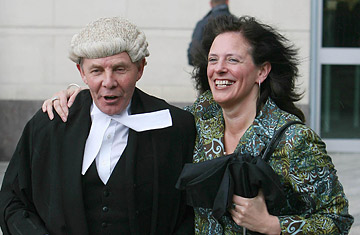
Sunday Tribune journalist Suzanne Breen (right) congratulates her legal council Arthur Harvey QC outside the High Court in Belfast, after she won the right today to withhold information about the Real IRA from the police.
It's a principle that's drummed into reporters from the day they start their careers: confidential sources always stay secret. But what if revealing a journalist's sources could help solve a crime? Or help catch dangerous terrorists?
That was the question at the heart of the case of Suzanne Breen — a journalist in Northern Ireland who refused to co-operate with police after they demanded she hand over notes and other materials relating to a terrorist attack in March that killed two soldiers. Over a month after the high-profile case was first heard in a Belfast court, a judge ruled in the journalist's favor on June 18.
A prominent investigative reporter in Northern Ireland, Suzanne Breen received the phone call from the Real IRA claiming responsibility for the murder of two British soldiers at Massereene army barracks in March — an attack that stunned Northern Ireland and stoked fears of a return to the sectarian conflict of the past. Two days later, a policeman was killed in Craigavon, County Armagh — the first police officer to be shot dead in the province in 12 years. And a series of low-level disturbances in April — petrol bombs, hoax devices, car-jackings — showed that dissident republicans, although small in number, remained intent on disrupting life in post-conflict Northern Ireland.
The Police Service of Northern Ireland (PSNI) are under increasing pressure to clamp down on terrorist splinter groups such as the Real IRA. But so far, only one person has been charged with the murders at Massereene barracks. Just over a month after Breen's article describing the call she received from the Real IRA appeared in the Dublin-based Sunday Tribune, of which she is Northern Editor, Breen received a letter from the PSNI, requesting she hand over notes, photographs, her cell phone and other records relating to the attack, in order to advance their investigation. Breen refused to co-operate, citing her right not to disclose her sources. Furthermore, she said she would face "a real and immediate threat to her life" from the Real IRA were she to comply with the police request.
Breen's case was not the first time that a reporter in Northern Ireland had locked horns with the police over their sources. In 1971, as the province entered the bloodiest period of its 25-year sectarian conflict, BBC reporter Bernard Falk was jailed for refusing to provide the police with details of an interview he carried out with an IRA spokesman. Over twenty years later, journalist Ed Moloney published a controversial interview with a member of a Protestant paramilitary group (and police informer) who had been accused of the murder of a Catholic solicitor. The paramilitary-turned-informer told Moloney that he had in fact alerted police officers to the murder plot, but that they had failed to act to prevent it. Moloney refused to comply with a police request to hand over his notes. The case against him was eventually dropped.
Speaking outside Belfast's Laganside Courts after Thursday's judgment, Breen's editor, Noirin Hegarty, described a journalist's protection of his or her sources as "an absolute value, not a convenient principle." But what swayed the Belfast Recorder Tom Burgess was the risk to Breen's life. In his ruling, Judge Burgess said complying with the police request could lead to "a breach of [Breen's] right to life under the European Convention [on Human Rights]" "The Real IRA have killed, and attempted to kill, for much less. During the attack on the soldiers at Massereene barracks, the gunmen shot and seriously wounded two men delivering pizza to the barracks. Their crime? Collaborating with the British army, which, in the eyes of dissident republicans, made them legitimate murder targets. "Handing over this material would make me a target for immediate assassination", said Breen in her defense hearing last week.
The PSNI said in a statement it would accept the decision. "Nevertheless, the investigation into this atrocity remains active and ongoing. Police will continue to endeavor to use every possible legal means to access information which may assist their inquiries."
But questions may now be asked in Northern Ireland why public money was spent on attempting to force a journalist to breach the confidentiality of her sources, not least by the journalist herself. "I am perplexed as to why the police wasted time and resources in taking this case", said Breen outside court after the judgment. That's a line of enquiry Breen and other reporters may be keen to follow.
